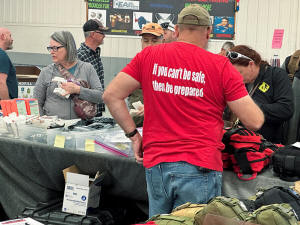'Prepping' for disaster diversifies as more Americans lose trust
 Send a link to a friend
Send a link to a friend
 [March 09, 2024]
By Brad Brooks [March 09, 2024]
By Brad Brooks
LONGMONT, Colorado (Reuters) - Brook Morgan surveyed booths at the
"Survival & Prepper Show" in Colorado that were stocked with boxes of
ammunition, mounds of trauma medical kits, and every type of knife
imaginable.
A self-described "30-year-old lesbian from Indiana," Morgan is one of a
new breed of Americans getting ready to survive political upheaval and
natural catastrophes, a pursuit that until recently was largely
associated with far-right movements such as white nationalists since the
1980s.
Researchers say the number of preppers has doubled in size to about 20
million since 2017. Much of that growth is from minorities and people
considered left-of-center politically, whose sense of insecurity was
heightened by Donald Trump's 2016 election, the COVID-19 pandemic, more
frequent extreme weather and the 2020 racial justice protests following
the murder of George Floyd.
"I'm really surprised by the number of people of color here," Morgan
said. "I always went to these shows with my family in Indiana and it was
just white people who were my parents' age. There are a lot of younger
people here, too. It's a real change."
Morgan grew up in a prepper family and still considers herself
self-reliant and ready to handle a disaster but she left the prepper
world of her youth behind in part to escape the conservatism associated
with the movement.

The diversification of prepping was clear last weekend at the Survival &
Prepper show at the fairgrounds in Boulder County, a liberal district
which President Joe Biden won in 2020 by nearly 57 percentage points
over Trump. Over 2,700 people paid $10 each to attend the show,
organizers said, and attendees were varied.
Bearded white men with closely cropped hair and heavily tattooed arms
were there. But so were hippy moms carrying babies in rainbow colored
slings and chatting about canning methods, Latino families looking over
greenhouses and water filtration systems, and members of the local
Mountain View Fire Rescue team, who in 2021 battled a devastating fire
in the region, giving CPR demonstrations and encouraging citizens to be
more prepared for extreme events.
Attendees and those running the booths said the show reflected the
concerns of millions of Americans who no longer feel that they can
always count on the government or private industry to provide the
basics, like electricity, water and food.
They cited the pandemic disruption of supply chains, the 2021 power grid
crisis in Texas that left millions without power, and the recent outages
for thousands of AT&T mobile users.
Chris Ellis is a colonel in the U.S. Army who works on disaster
preparedness and recovery and is a leading researcher into the prepper
movement who has tracked its growth to 20 million people based on
household resiliency data from the Federal Emergency Management Agency.
[to top of second column]
|

Attendees line up to pay for trauma medical kit at the "Survival &
Prepper Show" in Longmont, Colorado, U.S. March 2, 2024.
REUTERS/Brad Brooks

He said that what shapes individual preppers - which he defines as
someone who can live for a month with no outside support - is how
they react to a single question: "Do I feel safe?"
"People want to regain their agency, their sense of control, and do
something to match their fears to their actions," said Ellis, who
underscored that he did not speak on behalf of the Department of
Defense.
People motivated by climate change, Ellis said, tend to be
homesteaders who grow their own food and move to more "climate
proof" locations, such as the mild summer haven of Duluth,
Minnesota.
Others whose main fear is lawlessness are frequently the gun
enthusiasts stereotypically associated with the prepper movement.
The super rich often respond to their fears by spending millions to
build bunkers in remote spots.
For John Ramey, a former innovation advisor to the Obama
administration and creator of the prepper website The Prepared, the
community has grown to reflect American society at large in terms of
political beliefs and demographic categories.
"The only real unifying denominator among preppers these days is
people who are smart enough to be aware of what the world is like …
and they have the gumption to do something about it," Ramey said.
Back at the prepper show at the Boulder County fairgrounds, Jennifer
Council strummed her thumb against the edge of an ax, balanced it in
her hand and said it was perfect for both cutting down small trees
and doing the delicate shaving work needed to create tinder.
Council, a 50-year-old mom of three adult children and
self-described Black urban farmer, lives in a suburban home
northwest of Denver.
"Preppers used to be seen as extreme weirdos," Council said. "Then
the pandemic happened and grocery stores were short on food. Then
you had the unrest of protests around the police killings of young
Black men. Then you had the storming of the Capitol in Washington."
"People are realizing that it's important to be able to depend on
what you can do for yourself."
(Reporting by Brad Brooks; editing by Donna Bryson and Alistair
Bell)
[© 2024 Thomson Reuters. All rights reserved.]This material
may not be published, broadcast, rewritten or redistributed.
Thompson Reuters is solely responsible for this content.
 |